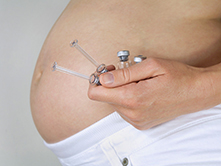Medical services
Univ. Prof. Dr. Dagmar Bancher
Fachärztin für Geburtshilfe und Gynäkologie
Prepare for pregnancy

I would be pleased to arrange a consultation and examine you in order to provide the best possible preparation for your upcoming pregnancy!
I would be pleased to arrange a consultation and examine you in order to provide the best possible preparation for your upcoming pregnancy! Here are most of all the points you should consider:
- Nutrition and pregnancy: If you wish to become pregnant, a healthy and balanced diet is very important. Lower your alcohol and coffee consumption and perhaps limit nicotine, too. This would be the perfect time to quit smoking. I would be happy to discuss with you the possibilities that exist for doing so.
- There is no ideal body weight for pregnancy. However, it is well-known that being extremely underweight or overweight (BMI under 18 or over 30) increases the probability of miscarriage or abnormal development. Some pregnancy-related disorders such as pre-eclampsia, gestational diabetes or premature birth are more prevalent in obese women. I can give you some places to go, if necessary, to help you optimize your body weight.
- If you have type I or II diabetes good metabolic control at the beginning of your pregnancy is essential to minimize congenital malformations in your child. Your HbA1c should ideally be below 6.5%.
- If you suffer from an under or overactive thyroid, I can control the stimulating hormone and move it to a TSH value that would best prepare you for a possible pregnancy.
- Pap smear: I can do a pap smear to diagnose any potential abnormalities before pregnancy and treat them, if necessary.
- Bacteriological smears: I can check for any infections as some germs can cause infertility while others lead to premature births.
- Vaccinations: You should have had all your vaccinations (especially against rubella and chicken pox) and perhaps even a blood test to determine your viral titer. If you are not adequately protected, a vaccine is recommended! Contracting either rubella or chickenpox while you are pregnant can lead to birth defects or serious illnesses in your child.
- Blood pressure: high blood pressure should either be lowered or treated, if appropriate, before becoming pregnant. Any increase in blood pressure during pregnancy can lead to pre-eclampsia or growth retardation in your child.
- Medications: Many drugs can be taken during pregnancy while others can harm your unborn child. I would be happy to review any medications you are taking and advise you about which ones you can still take while pregnant.
- Ideally, folic acid tablets should be taken 2-3 months before you expect to become pregnant to minimize the likelihood of neural tube defects, lip malformations or cleft lip and palate in the fetus. I’ll be pleased to prescribe the appropriate medicinal product for you.
Gestational Diabetes

It strikes approximately one in ten pregnant women.
Gestational diabetes (GDM) is a blood sugar disorder that either appears for the first time or is discovered during pregnancy.
It strikes approximately one in ten pregnant women.
The diagnosis is usually made during the pregnancy passport’s second blood test in the 24th to 28th week when the oral glucose tolerance test (OGTT) is given. If any of the limits listed below are exceeded, therapy is supposed to be initiated.
The values in the following table are for the 75-gram limit set for an OGTT by the Austrian Society of Gynecology and Obstetrics and the IADGPS criteria for pregnancies.
|
|
mg/dl limit |
mmol/l limit |
|
Fasting |
92 |
5.1 |
|
After 1 hour |
180 |
10 |
|
After 2 hours |
153 |
8.2 |
Why should pregnant women be educated about GDM?
Increased demands and hormonal changes during pregnancy can upset a balanced metabolism, leading to an increase in maternal blood glucose levels. Because a mother’s blood sugar, but not insulin, can cross the placental barrier GDM leads to a rise in fetal blood glucose. This stimulates the fetal pancreas, spurring increased production of fetal insulin, which brings about fetal hyperinsulinemia (raised insulin levels in the fetus) and activates growth factors. Fetal hyperinsulinemia can cause a number of complications that can occur in fetuses and newborns.
What are the typical complications experienced by children of mothers who contracted GDM while they were pregnant?
Typical complications are accelerated physical growth (especially the child’s abdomen) and proliferation of amniotic fluid. Children are born larger and yet not fully mature, and prone to adaptive disorders with respiratory problems, restlessness or tremors after birth. In the first days of life, this may lead to increased jaundice and disturbances in hemoglobin and calcium levels. Fetuses of women with severe or untreated GDM are likewise apt either to be born prematurely or more likely to die suddenly in the uterus.
Recent studies show children of mothers whose gestational diabetes were either poorly controlled or untreated tend already in preschool or by school age to experience developmental disorders, hypertension, increased blood lipids and elevated glucose levels up to overt diabetes.
On the other hand, the outcome for children of women whose gestational diabetes was controlled well is virtually the same as for a healthy pregnancy.
Therefore, our goal is to keep blood glucose levels in mothers as well-adjusted as possible with an appropriate diet, adequate exercise and possibly insulin in order to minimize or even prevent fetal hyperinsulinemia. Although such treatment during pregnancy is preferable for the sake of the unborn child, it can also lower the likelihood of complications in mothers such as metabolic disturbances, pre-eclampsia (high blood pressure during pregnancy) or possible urinary tract or vaginal infections.
What happens after birth and is there anything I should watch out for?
In most cases, blood sugar levels normalize after the child is born as the additional burden of pregnancy is lifted. Nevertheless, these women should have an OGTT performed around 2-3 months after the birth to confirm the normalization of blood glucose metabolism and to detect any metabolic abnormalities at an early stage.
The probability of a recurrence in GDM during subsequent pregnancies is up to 50%. Approximately half of women who experience GDM will within 10 years after the child’s birth have either disturbed blood sugar levels or contract diabetes.
Results from new studies indicate that a change in lifestyle with adequate exercise, weight loss and a balanced diet reduces the risk of glucose metabolic disorders or even prevents them from occurring.
So remember!
- Have GDM treated and keep it under control as much as possible while you are pregnant – your child will thank you for it!
- Don’t forget this even after you are no longer pregnant!
If you have had GDM, consider yourself at risk! Remember to get adequate exercise, eat moderately and have your blood sugar regularly checked – for the sake of your health!
Ordination center Döbling:
- Mo:16:00 - 19:00
- Th:12:00 - 14:00
Address:
Heiligenstädter Straße 46-481190 Wien
Telefon: +43-1-360668000
Fax: +43-1-360668008
www.mednanny.com
Rudolfinerhaus:
Address:
Billrothstraße 781190 Wien
Telefon: +43-1-360365900
Fax: +43-1-360365103






Gesundheitspolitisch kümmere ich mich seit vielen Jahren um die Weiterentwicklung des Mutter-Kind-Passes in verschiedensten Gremien des Gesundheitsministeriums, der Österreichischen Ärztekammer und als Vorstandsmitglied der Österreichischen Gesellschaft für Gynäkologie und Gebursthilfe (ÖGGG).
Ich biete Ihnen eine kompetente und individuelle Betreuung in einem angenehmen Ambiente nach dem neuesten medizinischen und wissenschaftlichen Erkenntnisstand. Bei mir können sich Frauen jeden Alters gut aufgehoben fühlen!
Einen Kernpunkt meiner klinischen Tätigkeit bietet die Betreuung während der Schwangerschaft und Geburt. Durch meine große und jahrelange Erfahrung im Gebiet von Risiko-Schwangerschaften und Geburten am AKH Wien sind sie in der Schwangerschaft bei mir bestens aufgehoben.
Aber auch Untersuchungen an Kindern -und Jugendlichen, Vorsorgeuntersuchungen, Abklärung eines pathologischen Krebsabstriches, Verhütung oder Kinderwunsch, „prepare for pregnancy „, gutartige Operationen (z.B: Myom-OP, Laparoskopien, Konisationen, usw.) sind ein Teil meines Leistungsspektrums.
Ich bin Ärztin aus Leidenschaft und arbeite als Frau für Frauen!
Ich freue mich auf Ihren Besuch in meiner Ordination!
schließen